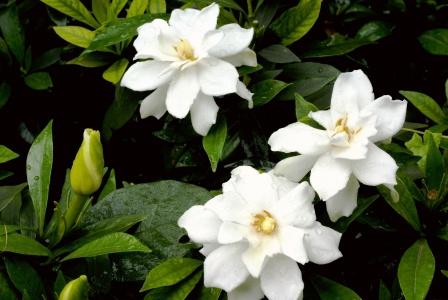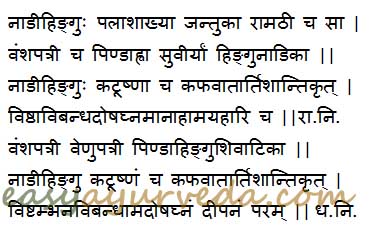Nadihingu Gardenia gummifera: Benefits, Remedies, Research, Side Effects

Nadi hingu- Gardenia gummifera is a herb mentioned in the ayurvedic pharmacopeia for the treatment of fever, indigestion, wounds, skin diseases and pain in abdomen due to intestinal worm or constipation.
Latin name- Gardenia gummifera Linn.
Family- Rubiaceae (Manjishta kula)

Table of Contents
Vernacular names
Names in different languages:
Hindi Name- Dikamali
English Name- Cambia gum or resin
Kannada Name- Bikke, Bukke, Dikkemalli
Tamil Name- Dikamalapi, Sinna kambil
Telugu Name- Telbampa
Sanskrit synonyms
Sanskrit Synonyms of Nadihingu:
Janthuka- Effective against intestinal worms
Pinda- It can be rolled to bolus form after collection
Ramatha, Palasha, Vamshapatra, Venupatri, Hingushivatika, Hingupatri, Pindahva,
It is to be noted that Nadi hingu and Hingu are different herbs in Ayurveda. Some of the synonyms given for Nadi hingu and Hingu are similar due to their similar properties and availability.
Nadi hingu is a big shrub or small tree growing to a height of 2 to 3 m and is found in the plains of India. The flowers of the plant are white in color which later turns to pale yellow. Fruits are found in the months of June to August. Resin is obtained by making a cut on the stem or branches of the plant and the resin resembles the gum of asafetida in color and odor.
Classical categorization
Dhanvantari Nighantu- Shatapushpadi varga
Raja Nighantu- Pippalyadi varga
Properties, part used, dosage
Gardenia gummifera Properties:
Rasa (Taste) – Katu (Pungent), Tikta (Bitter)
Guna (Qualities) – Laghu (Light for digestion), Ruksha (Dry in nature), Teekshna (Strong)
Vipaka – – Katu (Undergoes Pungent taste after digestion)
Veerya (Potency) – Ushna (Hot)
Karma (Actions) – Kaphavata shamaka (reduces vitiated kapha and vata dosha)
Part used- Resin/Gum
Dosage- 250-500 mg of resin powder
Chemical constituents, uses
Gardenia gummifera Chemical constituents:
The gum contains flavonoids like gardenin, nevadensin, wogonins, isocutellarein, apigenin and de- MeO- sudachitin.
Uses of Nadi hingu:
- The paste or the resin of Gardenia gummifera is applied over the wounds and area with pain. It is then tied with clean bandage cloth to reduce the complaints.
- The resin of the plant is kept over the tooth or gum affected with dental caries and inflammation of the gums.
- The resin in a dose of 200mg is dissolved in water or buttermilk and is given to patients suffering from indigestion and lack of appetite.
- The dried resin of the plant Gardenia gummifera is dissolved in water and given to patients suffering from intestinal worms, distention of abdomen, constipation and piles.
- Nadi hingu is given in a dose of 300- 500 mg to treat fever arising due to indigestion.
- Dissolved resin of the plant is given along with warm water to treat dyspnea and cough.
- The gum is given in a dose of 500 mg to treat skin disease.
Sanskrit verse

Balances Kapha and Vata Dosha
Deepana – improves digestion strength
Indicated in
Vibandha – constipation
Anaha – bloating, fullness
Side effects
Adverse reaction: The resin should not be given in an empty stomach as it may cause hyperacidity and nausea.
Interaction with medicines, supplements
Can this be used while taking Homeopathic medicine?
Yes. This product does not react with homeopathic medicine.
Can this medicine be continued while taking supplements like multivitamin tablets, Omega 3 fatty acids etc?
Yes. Generally, this product goes well with most dietary supplements. However, if you are taking more than one product per day, please consult your doctor for an opinion.
With western
medicines
Seek your
doctor’s advice if you are taking this product along with other western
(allopathic / modern) medicines. Some Ayurvedic herbs can interact with modern
medicine.
If both Ayurvedic and allopathic medicines are advised together, then it is
best to take Allopathic medicine first, wait for 30 minutes and then take the
Ayurvedic medicine.
Ayurvedic formulations
Formulations containing Nadi hingu:
Though there are many formulations containing Hingu, there are minimum formulations containing Nadi hingu.
Balant kada No.2: It is a proprietary medicine in decoction form used by women just after delivery for improving the appetite and digestion. It also helps in relieving tiredness and gives strength to the woman.
Research
Research articles about Gardenia gummifera:
Anti- oxidant property: The antioxidant activity was determined by 2,2-diphenyl-1-picrylhydrazyl (DPPH) assay, superoxide radical scavenging assay, reducing power assay, cerium (IV) amaranth dye assay, Ferric Reducing Antioxidant Property (FRAP) assay and total antioxidant capacity. In all the assays, the ethanolic extract of Gardenia gummifera Linn. is more effective in free radical scavenging activity than that of other two extracts.
Hepato protective action: The studies substantiate the use of Gardenia gummifera in folklore medicine for the treatment of liver disorders. The GGME at a dose of 300 mg/kg b.w. exhibited a significant hepato protective effect and BTF, BAF were found to have potential protective effects at a dose of 50 and 100 mg/kg. The hepato protective effect BAF was well comparable to that of Silymarin (50 mg/kg). The two selected bioactive fractions were found to possess an antioxidant property, which strongly supports their hepato protective effect. The hepato protective effects of the extracts were supported by their effect in shortening the sleeping time and decreasing the liver weight in rats.
Anti- bacterial activity: Present study was aimed at evaluating antibacterial activity of ethanolic and chloroform extracts of G.gummifera using agar well diffusion method. The activity spectrum was tested against different types of Gram positive (B. subtilis and S. aureus) and Gram negative (E. coli and P. aeruginosa) bacterial strains. The activity of both the extracts was compared using Amoxycillin as standard. Chloroform extract showed significant activity against all pathogens when compared with ethanolic extract of G. gummifera.
Author: Dr.B.K.Prashanth M.D (Ayu), Ph.D
E mail: drprashanthbk@gmail.com
Systemic Action (Sthanika Karma)
External – Anthelmintic, Analgesic, promotes wound healing. Indicated in dental caries.
Digestive System – Improve taste, Carminative, Anthelmintic, facilitate movement of doshas in normal direction. indicated in loss of appetite, anorexia, constipation, Colic pain, Hemorrhoids etc. Especially indicated in Roundworm infection.
Circulatory System – Heart stimulant. Indicated in splenomegaly
Respiratory System –Helps to eliminate vitiated kapha dosha from the respiratory passage. Indicated in cough, breathing disorders, Hiccough etc.
Skin – it is indicated in skin disorders.
Satmikarana – It has scraping action on body tissues. Indicated in obesity and related disorders.
Tapakrama – Indicated in fever (Vishama jvara), Reduce cold and shivering associated with fever










